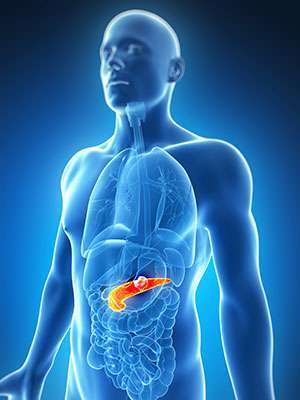
Pancreatic Cancer
Pancreatic cancer begins in the tissues of the pancreas, an organ in the abdomen located behind the lower part of the stomach.. Your pancreas produces enzymes that aid digestion and hormones that aid in blood sugar management.
The pancreas can develop a variety of tumors, including cancerous and noncancerous tumours.The most common type of pancreatic cancer begins in the cells that line the ducts that transport pancreatic digestive enzymes (pancreatic ductal adenocarcinoma).
Pancreatic Cancer Symptoms
Pancreatic cancer symptoms do not usually appear until the disease has progressed. They could include:- Backache caused by abdominal pain.
- Appetite loss or unintentional weight.
- Yellowing of the skin and eye whites (jaundice).
- Stools in light colours.
- Dark urine.
- Skin itch.
- Diabetes diagnosis or existing diabetes that is becoming more difficult to control.
- Clots in the blood
- Fatigue
Pancreatic Cancer Causes
It is unknown what causes pancreatic cancer. Doctors have identified some risk factors for this type of cancer, such as smoking and having certain inherited gene mutations.
Knowing about your pancreasYour pancreas is approximately 6 inches (15 centimetres) long and resembles a pear lying on its side. It secretes hormones, including insulin, to assist your body in processing sugar from the foods you eat. It also produces digestive juices to assist your body in digesting food and absorbing nutrients.
How Pancreatic Cancer DevelopsPancreatic cancer develops when cells in your pancreas undergo DNA mutations. A cell's DNA contains the instructions that tell the cell what to do. These mutations instruct the cells to grow uncontrollably and to live after normal cells would have died. These accumulating cells have the potential to form a tumour. Pancreatic cancer cells can spread to nearby organs and blood vessels, as well as distant parts of the body, if left untreated.
Risk elements
The following factors may increase your risk of pancreatic cancer:- Smoking
- Diabetes
- Chronic pancreatic inflammation (pancreatitis)
- Family history of cancer-related genetic syndromes, such as a BRCA2 gene mutation, Lynch syndrome, and familial atypical mole-malignant melanoma (FAMMM) syndrome
- Pancreatic cancer in the family
- Obesity
- Older age, as the majority of people are diagnosed after the age of 65.
- A large study found that the combination of smoking, long-standing diabetes, and a poor diet increases the risk of pancreatic cancer more than any of these factors alone.
Complications
As pancreatic cancer advances, it can lead to complications such as:Loss of weight
Jaundice
Abdomen Pain
Obstruction of the bowel
Prevention
You can lower your risk of pancreatic cancer by doing the following:Quit smoking
Keep a healthy weight
Your risk of cancer
Pancreatic Cancer Surgery -
Pancreatic cancer patients may undergo the following operations:Surgery for pancreatic head tumours
The Whipple procedure
Surgery for pancreatic body and tail tumours.Distal pancreatectomy
The pancreas is surgically removed